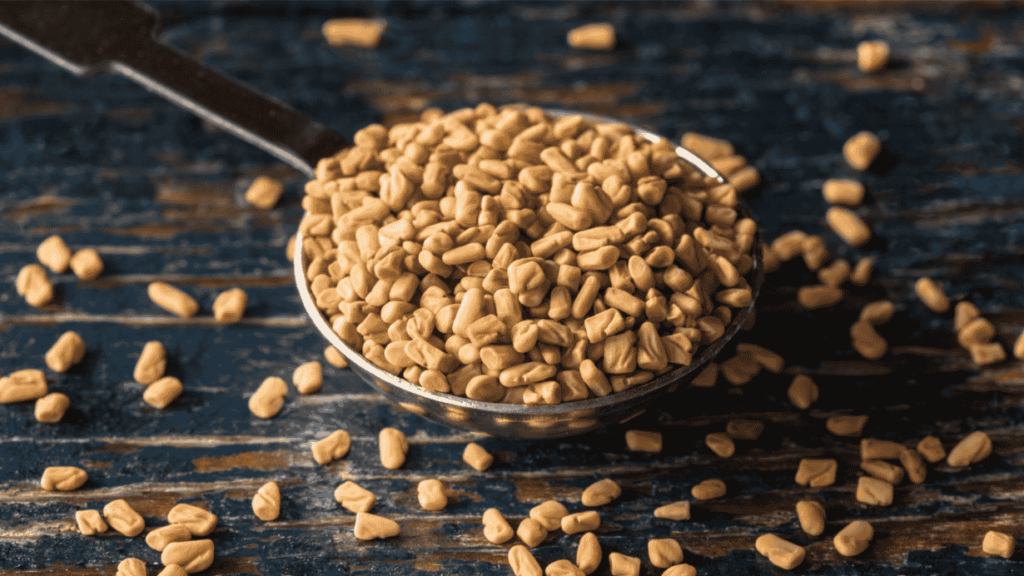Fresh Fenugreek Seeds





Fenugreek Seeds
Menu

| Heading | Information |
|---|---|
| Fenugreek | Bitter seeds foundational to curry powders and Ayurvedic remedies. |
| Producing Countries | India, Mediterranean |
| Producing Benefits | Supports Digestion: Fenugreek seeds are known to help improve digestion. They can reduce indigestion, bloating, and other digestive issues by stimulating the production of digestive enzymes. Blood Sugar Control: Fenugreek seeds have been studied for their potential to help manage blood sugar levels. They may improve insulin sensitivity, making them beneficial for individuals with type 2 diabetes. Promotes Milk Production: Fenugreek seeds are often used as a galactagogue, which means they can help increase breast milk production in breastfeeding mothers. Rich in Antioxidants: Fenugreek seeds contain antioxidants like flavonoids, which help protect the body from oxidative damage and reduce the risk of chronic diseases. Anti-inflammatory: The seeds have natural anti-inflammatory properties, which can help reduce inflammation in the body and may provide relief from conditions like arthritis. Boosts Libido: Fenugreek has been traditionally used to increase libido and improve sexual function, particularly in men. Heart Health: Fenugreek seeds are rich in soluble fiber, which can help reduce cholesterol levels, contributing to better heart health. |
| Ingredients | Fenugreek seeds come from the Trigonella foenum-graecum plant, which belongs to the legume family. The seeds are small, yellow-brown in color, and have a slightly bitter taste. Possible Additives: Fenugreek seeds are usually sold whole or ground without additives. However, ground fenugreek may sometimes contain preservatives or anti-caking agents, depending on packaging. |
| Allergen | Fenugreek seeds are generally considered safe for most people, but they may cause allergic reactions in some individuals, especially those allergic to legumes (such as peanuts or soy). Fenugreek can also cause skin irritation or rashes in sensitive individuals. Cross-Contamination: Fenugreek seeds may be processed in facilities that handle other allergens, such as nuts or seeds, increasing the potential for cross-contamination. |
| Storage | Cool, Dry Place: Store fenugreek seeds in a cool, dry place, away from heat or direct sunlight, to preserve their flavor and potency. Airtight Container: Once opened, fenugreek seeds should be kept in an airtight container to protect them from moisture and air, which can cause them to lose flavor and spoil. Whole vs. Ground: Whole fenugreek seeds have a longer shelf life compared to ground fenugreek. Ground fenugreek should be used within a few months for the best flavor and freshness. Refrigeration: Fenugreek seeds do not require refrigeration, but they can be stored in the fridge if you live in a hot, humid climate to extend their shelf life. |
| Nutrition Facts | Nutrition Facts (per 1 teaspoon or ~2.3 grams of fenugreek seeds): Calories: Approximately 8 kcal Total Fat: 0.4 g Saturated Fat: 0.03 g Sodium: 1 mg Total Carbohydrates: 1.4 g Dietary Fiber: 1.0 g Sugars: 0.1 g Protein: 0.5 g Vitamins and Minerals: Vitamin C: 0.5 mg Calcium: 8 mg Iron: 0.4 mg Magnesium: 5 mg Potassium: 22 mg Manganese: 0.1 mg Copper: 0.02 mg |


